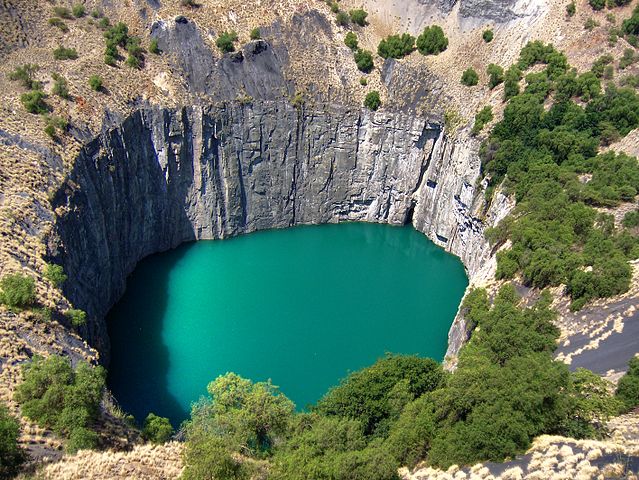Kimberley’s desperate miners: where the formal and informal sectors clash

Hundreds of unemployed Kimberley residents have turned to digging deserted mine dumps to earn a living.
The dumps belong to De Beers and the soil comes from the Big Hole and other mines in the area.
Shelters made from plastic bags and cupboards, as well as small fires for cooking, are visible in the bushes wherever there are potential mineral leftovers.
Pabi Dibeco (33) says he can’t understand why authorities are criminalising the residents’ only source of income. He previously worked at a garage and has no work experience. “I am married with two kids, doing this in the face of massive unemployment is better than resorting to crime. Who will employ me with my grade 11?” he asked.
He was supported by a fellow miner Harry Scott (38), “Stopping us is tantamount to denying us our mineral rights … We demand a fair share of our land’s riches, is it too much to ask for these leftovers?” said Scott.
Hull Street is the main street where the dumps are located. Diggers are seen there and in Samaria Road, as well as in areas such as Kenilworth, The Floors and Colville.
They were previously arrested for “trespassing and illegal mining” but according to miners GroundUp spoke to, charges were later dropped in court because “it was a trick to scare us off.”
According to Scott, the miners see the dumps as De Beers leftovers, and say the company has been mining in the town for many years without ploughing back into local communities.
Dibeco says that they want to be left alone and De Beers should donate the dumps and focus on big underground mines using heavy machinery and skilled labour.
It can take diggers months to discover a small diamond.
De Beers Spokesperson Tom Tweedy told GroundUp that the miners are operating illegally. “It’s exactly the same as someone coming into a person’s private home and taking their television or plough.”
According to Tweedy, some of the illegal mining is taking place on dumps owned by De Beers and managed by three black economic empowerment companies operating under the Kimberley Miners’ Forum which are processing the dumps. Tweedy says in other areas illegal mining is taking place on property owned by various other owners.
“Operating is a formal thing. It is not an ad hoc, environmentally devastating, alluvial digging operation. There are things one must do as a miner: be safe, rehabilitate. So even though these miners paint themselves as victims, there is nothing stopping them from registering with the Department of Mineral Resources as legal operators with the obligations that go with that. Illegal mining is patently linked to criminal activities and networks, and eventually undermines the viability of long-term legal operations,” said Tweedy.
Business Day has reported that De Beers is approaching the end of its operations in Kimberley, the world’s largest source of rough diamonds, by about 2018.

Kimberley’s Big Hole. Photo by Irene2005 - originally posted to Flickr as Big Hole, Kimberley, South Africa. Licensed under CC BY 2.0 via Wikimedia Commons.
Support independent journalism
Donate using Payfast

Don't miss out on the latest news
We respect your privacy, and promise we won't spam you.
Next: City’s young soccer stars compete in Rocklands
Previous: Draft drone rules silent on privacy and weapon concerns
Letters
Dear Editor
The emergence of new mining technology is a threat to employment. Not only will we experience unemployment but a higher rate of poverty, divorces etc. This matter should be looked upon very closely because it is trending and affecting local people and beyond.
If one machine can perform the job of 14 people and double the daily target then it reduces the life span of these local mines which will lead to no future jobs.
New technological introduction requires qualified personnel which current employees don't have. There should have been training for employees, so that it becomes very easy to convert them to the new system, rather than to rob people of their land and minerals. Skills development plays a fundamental role in preparation for future work readiness.
It is really not good to see people suffer because of the unfaithful mine management with empty promises.

This article is licensed under a Creative Commons Attribution-NoDerivatives 4.0 International License.
